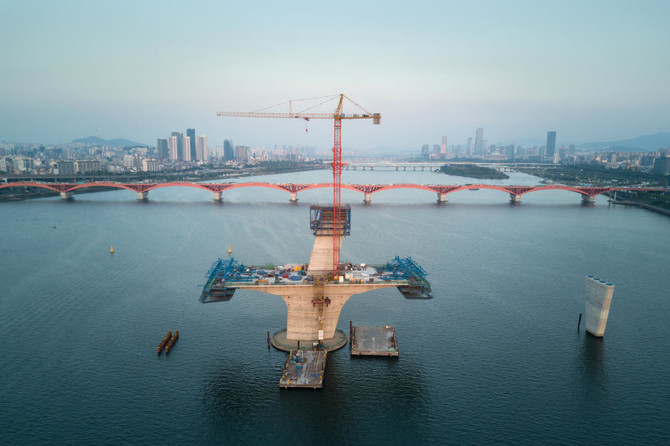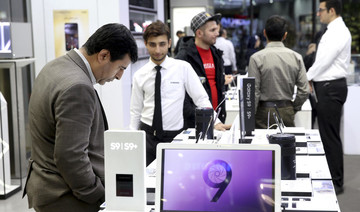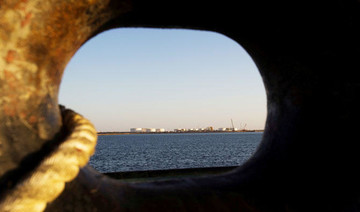SEOUL: South Korea may have won an exemption from the US to continue Iranian oil imports, but major construction companies here are still reeling from the renewed American sanctions against Tehran.
Hyundai Engineering & Construction (E&C), a business arm of Hyundai Group, announced on Oct. 29 that it had scrapped a deal with Iran’s Ahdaf Investment Co. to build a petroleum refining facility in Iran.
The deal was worth $520 million — about 15 percent of the $3.4 billion construction project led by Hyundai Engineering consortium. Hyundai Engineering is an infrastructure unit owned by Hyundai Motor Group.
“We had no choice but to cancel the deal,” Yum Dong-yeon, a spokesman for Hyundai E&C, told Arab News. “We’re just sorry to lose the deal, and it is difficult now to anticipate if and when we will be able to be engaged in Iran businesses again.”
The remaining project led by Hyundai Engineering is expected to be nullified.
“It’s impossible now to carry out the deal, as a grace period of the preliminary contract has already expired,” a Hyundai Engineering public affairs official said, asking not to be named.
SK Engineering & Construction (E&C) has also been hit by the renewal of US sanctions against Iran. The firm, affiliated with South Korea’s third largest conglomerate SK Group, signed a $1.6 billion preliminary contract last year to upgrade a refinery in Tabriz, some 600 kilometers northwest of Tehran.
The firm also bagged a $3.6 billion contract to build and operate new power plants in Iran under a joint project with Turkey’s UNIT International. The contract is Iran’s largest private energy project, to produce combined generation capacity of 5,000 megawatts.
“We have yet to enter main contracts with Iranian counterparts, so we haven’t suffered any financial loss at the moment,” said Yeom Suk-bae, a senior communications manager at SK E&C. “However, it’s a setback obviously to our plan to make inroads into Iran, a new and growing market in the Middle East.”
Daelim Industrial is also one of the South Korean construction firms that have canceled projects in Iran. The company revoked a $2 billion deal in June with an Iranian oil refining company.
Kim Jong-gook, head of the Middle East and Africa business bureau at the International Contractors Association of Korea, painted a grim picture of South Korean construction projects in Iran in the long-term.
“South Korean construction firms have already been affected by the feud between the United States and Iran before the sanctions come into force,” Kim said.
The restored US sanctions, focused on banning any financial transaction with Iran, would hinder South Korean firms from going ahead with any contract with Tehran, he said.
“For South Korean construction companies, Iran is regarded as a new market with great potential,” Kim said. “As Iran’s oil exports are to be reduced in the aftermath of the restored US sanctions, energy corporations of the Middle East nation will likely suffer the shortage of foreign exchange, which will lead to the shrinkage of their construction projects.”
Oil refineries and petrochemical firms in South Korea breathed a sigh of relief about the “temporary waiver” for Iranian oil imports, but braced for risks down the road.
As one of the eight countries exempted from the US sanctions, South Korea is allowed to buy Iranian oil over the next six months on the condition that the imports volume should be reduced significantly. Any payment must be made through a bilateral Korean won currency account.
The South Korean government did not disclose the scale of reduction in Iranian oil imports, but oil refinery industry sources estimate that they are allowed to import about 4 million barrels per month, more than half of last year’s imports volume. South Korea imported an average of 12 million barrels per month of crude and condensate from Iran last year, according to the state-run Korea National Oil Corp.
South Korea in particular is a large buyer of Iranian condensate, a super light form of crude oil used by its large petrochemical industry. Of the Iranian oil imported last year, condensate accounted for some 70 percent.
“We’re trying to diversify sources of oil imports in the wake of Iran sanctions, but it’s not so easy to find alternatives for condensate,” an official of SK Innovation, the largest petrochemical company in South Korea, said on condition of anonymity.
Amid a sharp drop in imports from Iran, Qatar has emerged as the biggest export of condensate to South Korea, according to the Korea Petroleum Association. Qatar accounted for slightly more than 80 percent of South Korean condensate imports in September, with other countries such as Nigeria, Norway and Libya being considered as alternative sources.
The South Korean government is seeking to come up with measures to minimize the impact of the US sanctions on Iran.
“We’ll keep discussing with the United States and Iran over measures related to the sanctions and their effects on the Korean industry,” said Kim Jang-hee, head of the Ministry of Trade, Industry and Energy’s Americas Division.
South Korean construction firms hit hard by Iran sanctions
South Korean construction firms hit hard by Iran sanctions

- Seoul imports about 12m barrels per month of oil from Iran.
- Contractors feel impact of sanctions on overseas orders.
Riyadh residential market sales surge 77%: CBRE report

RIYADH: Saudi Arabia’s residential market experienced robust growth in demand, with Riyadh witnessing a 77 percent year-on-year increase in sales transactions in the first quarter, a new report showed.
According to global consultancy firm CBRE, Jeddah residential transactions surged by 92.9 percent in the first three months of this year, while Dammam saw a 28.0 percent increase year-over-year.
Taimur Khan, head of research MENA, said: “Whilst we have seen strong performance across commercial sectors within Saudi Arabia in the recent past, something which continues to date, we are now beginning to see the residential sector also register a significant surge in demand. This is, in turn, underpinning performance in the sector.”
As new stock continues to be delivered, he said they expect this trend to continue, with demand outpacing supply for some time to come.
“However, we also expect that there might be some bifurcation in performance within the residential sector, with new quality assets likely to register record rates,” added Khan.
Villa prices in Riyadh, Jeddah, and Khobar rose by 3.6 percent, 0.2 percent, and 3.1 percent, respectively. Meanwhile, Dammam saw a slight decline of 0.5 percent.
In the apartment segment, prices in Riyadh, Dammam, and Khobar increased by 8.4 percent, 0.9 percent, and 0.4 percent, respectively, compared to the previous year.
However, Jeddah experienced a 1.1 percent decrease in average apartment prices over the same period.
Throughout the first quarter of this year, the office sector witnessed a slowdown in rental growth across all market segments.
Prime rents in Riyadh’s occupier market surged by 14.5 percent, while Grade A and Grade B rents increased by 11.8 percent and 10.3 percent, respectively.
In Dammam, Grade A rents rose by 8.0 percent, Grade B by 6.2 percent, and Khobar’s Grade A rents saw a 4.6 percent increase.
Occupancy rates stood at 93.8 percent, 99.7 percent, and 99.4 percent for Prime, Grade A, and Grade B segments in Riyadh, while Dammam and Khobar displayed respective Grade A occupancy rates of 86.3 percent and 85.2 percent as of the first quarter.
In Jeddah, Grade A and Grade B rents increased by 13.6 percent and 13.1 percent, respectively, with occupancy rates reaching 92.5 percent and 86.6 percent.
The hospitality sector’s performance remained strong throughout the first quarter due to high visitation levels.
Year-on-year, from January to March 2024, the average occupancy rate saw a slight uptick of 0.1 percentage points.
Additionally, the country experienced an 11.8 percent increase in average daily rate, leading to a 12.0 percent rise in revenue per available room.
Closing Bell: TASI dips to close at 11,503 points

RIYADH: Saudi Arabia’s Tadawul All Share Index dipped on Thursday, losing 193.02 points, or 1.65 percent to close at 11,503.49
The total trading turnover of the benchmark index was SR13.13 billion ($3.50 billion) as 65 stocks advanced while 161 retreated.
Similarly, the MSCI Tadawul Index dipped by 24.77 points, or 1.70 percent, to close at 1,436.07.
However, the Kingdom’s parallel market, Nomu, increased by 307.64 points or 1.17 percent, to close at 26,610.57. This comes as 28 stocks advanced, while as many as 30 retreated.
The best-performing stock was the Mediterranean and Gulf Insurance and Reinsurance Co., as its share price surged by 7.66 percent to SR29.50.
Other top performers included Almasane Alkobra Mining Co. and Alkhorayef Water and Power Technologies Co., whose share prices soared by 5.37 percent and 4.55 percent, to stand at SR62.80 and SR161 respectively.
National Co. for Learning and Education and East Pipes Integrated Co. for Industry also performed well.
The worst performer was ACWA Power Co. whose share price dropped by 9.98 percent to SR402.40.
Share prices of Fawaz Abdulaziz Alhokair Co. as well as the Co. for Cooperative Insurance dropped by 7.89 percent and 6.41 percent to stand at SR8.40 and SR131.40, respectively.
The best-performing stock of the day on the parallel market was Mohammed Hadi Al-Rasheed and Partners Co., as its share price surged by 12.58 percent to SR34.90.
Other top performers included Osool and Bakheet Investment Co. and Abdulaziz and Mansour Ibrahim Albabtin Co., whose share prices soared by 12.38 percent and 6.86 percent, to stand at SR44.95 and SR45.95 respectively.
Aramco sets butane, propane prices for June

RIYADH: Saudi Aramco maintained propane contract prices for June month on month at $580 per tonne while price for butane was set at $565 a tonne.
Propane and butane are types of liquefied petroleum gas with different boiling points.
LPG is mainly used as a fuel for cars, heating and as a feedstock for other petrochemicals.
Aramco’s OSPs for LPG are used as a reference for contracts to supply the product from the Middle East to the Asia-Pacific region.
China is the world's largest consumer and importer of LPG, or combination of propane and butane.
China’s imports of LPG jumped about 46 percent to 3.08 million metric tons in March from February.
Saudi Shoura Council calls on GACA to establish low-cost airports around Riyadh

RIYADH: Saudi Arabia will soon assess the feasibility of establishing low-cost airports around Riyadh following a call from the Kingdom’s Shoura Council.
The country’s Consultative Assembly urged the General Authority of Civil Aviation to build and operate the planned airports or offer them to the private sector in a build-operate-transfer manner, according to a post on X.
Additionally, the council recommended that GACA collaborate with national carriers to increase domestic flights and diversify their destinations to enhance transportation and tourism services.
These initiatives align with the Kingdom’s aviation sector goals, such as increasing passenger numbers and expanding flight routes. They also support GACA’s vision of enabling Saudi leadership in aviation through customer-centric and digitally-enabled regulatory services.
The council also emphasized the need for GACA to activate the annual target for air freight in accordance with the National Transport and Logistics Strategy.
Earlier this week, Riyadh-based King Khalid International Airport was recognized as one of the top three performing terminals in the Kingdom, according to official data.
In its monthly report for April, GACA indicated that the airport led the category for international terminals with over 15 million passengers annually, achieving an 82 percent compliance rate with the authority’s standards.
The evaluation, based on 11 key criteria, aims to improve service quality and enhance the passenger experience.
Earlier in May, in an interview with Arab News on the sidelines of the Future Aviation Forum held in Riyadh, Vice President of GACA for Quality and Traveler Experience, Abdulaziz Al-Dahmash, said the Kingdom has set “very ambitious targets” in this sector.
He noted that these targets include tripling the number of passengers compared to 2019, handling 4.5 million tonnes of cargo, and establishing more than 250 direct destinations from the Kingdom’s airports to global locations.
“Those key targets need enablers, and one of the key pillars is our passenger experience, and we always say that the passenger comes first, so from that perspective, we started different programs from a regulator perspective,” Al-Dahmash told Arab News at the time.
Saudi Arabia issues new sukuk worth $17.09 billion

RIYADH: Saudi Arabia has issued new sukuk worth SR64.1 billion ($17.09 billion) after it completed an early purchase of more than SR63.1 billion of outstanding debt.
In a statement, Saudi Arabia’s National Debt Management Center said that the new Shariah-compliant debt product has been divided into three tranches.
The first tranche valued at SR16 billion is set to mature in 2031, while the second one amounting to SR29.3 billion will be due in 2034.
The third tranche is worth SR18.8 billion and is set to mature in 2039.
“This initiative is a continuation of NDMC’s efforts to strengthen the domestic market,” said NDMC in the statement.
It added: “Further, this initiative enables NDMC to exercise its role in managing the government debt obligations and future maturities. This will also align NDMC’s effort with other initiatives to enhance the public fiscal in the medium & long term.”
On May 29, NDMC announced the completion of a $5 billion international trust certificate issuance, under the Kingdom’s Global Trust Certificate Issuance Program.
In a statement, the official body said that the total order book of applications reached around $20 billion, which equals an oversubscription of four times.
Earlier this month, NDMC revealed that the Kingdom completed its riyal-denominated sukuk issuance for May at SR3.23 billion.
The Shariah-compliant debt product for May was divided into two tranches.
The first tranche valued at SR71 million is set to mature in 2029, while the second one amounting to SR3.16 billion is due in 2036.
In April, an analysis released by S&P Global projected that sukuk issuance globally is expected to hover between $160 billion and $170 billion in 2024.
In the same month, another report by Fitch Ratings also echoed similar views and said that global sukuk issuance is expected to continue growing in the coming months of this year.
Fitch noted that economic diversification efforts and the rapid development of the debt capital market in the Gulf Cooperation Council region would propel the growth of the sukuk market in the coming months.













